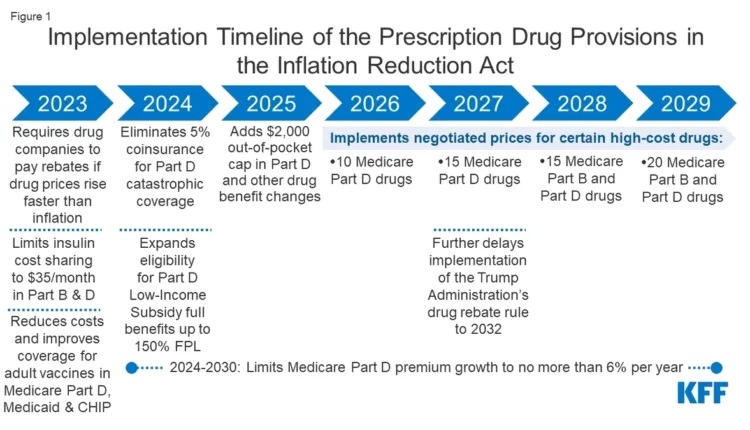
Decoding the Impact of Inflation Reduction Act on US Drug Prices
TL/DR –
The Inflation Reduction Act (IRA), introduced in 2022, caps out-of-pocket expenses for brand-name drugs for Medicare beneficiaries and lets Medicare negotiate prices for certain expensive drugs. The law is predicted to save Medicare Part D enrollees substantial amounts from 2025 by removing the 5% co-insurance requirement and setting a $2,000 limit on out-of-pocket drug costs. However, it also has ripple effects on pharmaceutical companies, insurers, and privately insured Americans, with drug manufacturers filing lawsuits and increasing premiums in response, and the federal government set to save $237 billion over a decade, though it may reduce the number of new drugs entering the market.
Decoding the Inflation Reduction Act
The 2022 Inflation Reduction Act (IRA) has revolutionized the U.S. pharmaceutical market, influencing Medicare drug pricing and patient expenses. With a limit on brand-name drugs out-of-pocket costs and enabling Medicare to discuss prices for high-priced drugs, the law delivers immediate relief for Medicare beneficiaries and aims to regulate pharmaceutical pricing.
Immediate and Long-Term Benefits for Medicare Patients
As per the Medicare Rights Center’s issue brief, the IRA promises significant savings for millions of Medicare Part D subscribers from 2025 onwards. It eliminates the 5% coinsurance requirement and restricts out-of-pocket drug expenses to $2,000, providing relief for patients with persistent and sporadic drug costs. Additional benefits comprise free vaccines, reduced insulin prices, improved ‘Extra Help’ program access, and a drug negotiation program for Medicare beneficiaries.
Broad Impact of the Inflation Reduction Act
The IRA’s influence is comprehensive, impacting pharmaceutical companies, insurers, and private insured Americans. Pharma firms have responded by filing lawsuits and increasing premiums. The Congressional Budget Office estimates the Act’s drug pricing elements would save the federal government $237 billion over ten years, although it might decrease the volume of drugs entering the market. To address overpriced drugs, the Biden administration has introduced a plan to seize drugs developed through National Institutes of Health-funded research.
Challenges and Future Considerations
The IRA has instigated a broad conversation about the financial strain on Medicare beneficiaries and hurdles in enforcing price reforms. Concerns include the exemption of orphan drugs from price negotiation and potential impact on future innovation. Discussions also revolve around the coverage of drugs chosen for the price negotiation program under Medicare Part D and the updated ASP Data Collection System. Additionally, the IRA has widespread implications for investments in clean energy, job creation, and economic benefits. Patient advocacy groups, like Patients for Affordable Drugs, significantly contribute to the discussions surrounding the IRA.
—
Read More US Economic News
